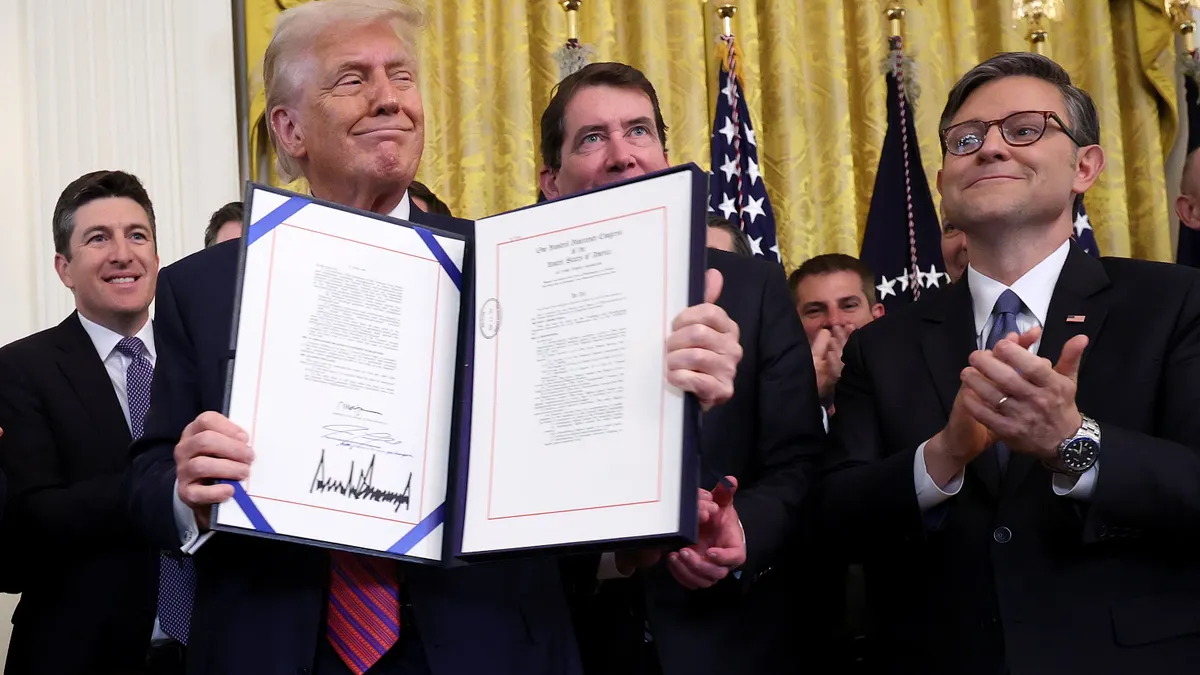Dive Brief:
- President Donald Trump signed the Guiding and Establishing National Innovation for U.S. Stablecoins Act, known as the Genius Act, into law on Friday, the White House announced, despite criticism from some consumer advocacy organizations.
- After both chambers of Congress passed the legislation, Consumer Reports decried the bill as posing a risk to consumers. The advocacy group criticized the law for not establishing federal insurance protection against consumer losses, implementing too little federal oversight and failing to require third-party audits to verify consumer reserves, per a July 17 press release from the organization.
- The group also noted that the law requires stablecoin issuers to disclose redemption policies, but does not require them to redeem consumers’ stablecoins for dollars within a reasonable or enforceable period, which raises “the risk of delayed access to funds in a crisis.”
Dive Insight:
Prior to Congress passing the bill, Consumer Reports urged lawmakers to oppose the Genius Act unless the law was amended to include stronger consumer protections. In addition to its other critiques, the group denounced the law for failing to clearly apply the Electronic Fund Transfer Act and other financial protections to shield consumers from fraud, errors and unauthorized transactions, according to the press release.
“Stablecoins should help consumers—not put them in harm’s way,” Chuck Bell, advocacy program director at Consumer Reports, said in a statement. “Consumers increasingly encounter stablecoins in apps, wallets, and digital platforms — and they deserve clear rules and real protections,” Bell said. “The GENIUS Act does not provide the safeguards that consumers reasonably expect when they use products that function like digital cash.”
As the Genius Act made its way through Congress, Sens. Roger Marshall and Dick Durbin aimed to use the legislation to advance their Credit Card Competition bill. With a proposed amendment to the Genius Act, the two sought to change the Electronic Fund Transfer Act to force credit card issuers make more networks available to merchants for processing credit card transactions. But they failed to attach the bill as an amendment.
Beyond Consumer Reports’ criticisms, others have asserted that the Genius Act doesn’t protect consumers. Though the legislation provides some regulatory clarity for the stablecoin market, Ryan Peters, assistant professor at Tulane University, noted in an op-ed that Congress and regulators must quickly implement more measures to provide other safeguards, such as daily reserve transparency.
Signing the Genius Act into law is the latest step in President Trump’s efforts to embrace the cryptocurrency industry. Days after he took office, Trump issued an executive order seeking to “support the responsible growth and use of digital assets, blockchain technology, and related technologies across all sectors of the economy.” Weeks later, the President established a strategic national cryptocurrency reserve, which included digital currencies such as ether, bitcoin, Ripple’s XRP and Solana’s SOL, among others.
“President Trump is fulfilling his campaign promise to position America as the global leader in cryptocurrency,” a statement from the White House said. “President Trump promised to make the United States the ‘crypto capital of the world,’ emphasizing the need to embrace digital assets to drive economic growth and technological leadership.”












